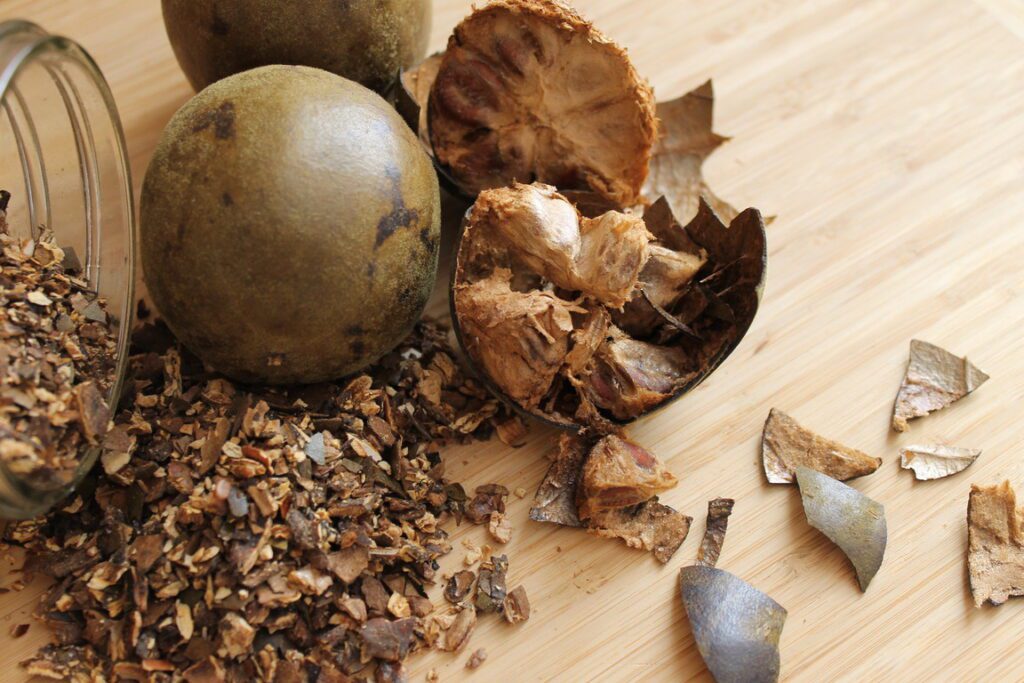Monk fruit in the raw? Monk fruit is named after the Buddhist monks who first used it. During the 20th century, Professor GW Groff attempted to grow the monk plant. However, the attempt was unsuccessful as the flowers were not visible.
Agricultural technology developed by CSIR-IHBT The seed germination rate of monk fruit is slow and low. Thus, seed germination techniques have been developed to increase the germination rate and reduce the germination time.
The institute has developed planting methods and standardized planting times. It has also developed a method for producing specific planting materials.
And standardized harvesting times to achieve high mogroside-V content in fruits. According to CSIR-IHBT, this is the first practice of cultivating monk fruit in India.
According to Dr. Probir Kumar Pal, Principal Scientist, CSIR-IHBT, Monk fruit is “a perennial crop with a lifespan of between four and five years and begins to bear fruit eight to nine months after germination”.
Nature’s Sweet Superfood: Monk Fruit Monk fruit (Serratia Grosvenor), is a non-caloric, easy-to-rely-on “natural sweetener”.
Monk fruit’s sweet taste is primarily due to the cucurbitane-type triterpene glycosides called mogrosides. There are 346 million people with diabetes worldwide.
Many synthetic sweeteners of low calorific value have recently appeared in the pharmaceutical. and food industries, but their health hazards due to harmful side effects limit their usefulness.
Thus, the production of sugar substitutes, especially non-nutritive natural sweeteners, poses a great challenge to scientists.”
What are monk fruit sweeteners?
As we discussed the origin of the monk fruit. the second question that might excite you is – what do the monk fruit sweeteners do and how does it work?
Well, monk fruit sweetener is known to be a no-calorie sweetener. That can be used as an alternative to sugar that will give you the satisfaction and taste of something sweet yet it will not harm your body as compared to processed sugar which is available on the market. It is popularly known among sugar substitutes.
It is intensely sweet in nature. And it is also known to be 150 to 200 times sweeter as compared to normal sugar. which is why you only require small amounts to derive sweetness from it.
The monk fruit sweetener is used in various beverages and food items like desserts, soft drinks, juices, candies, chocolate dairy products, etc, and these are also widely used in baked goods.
How is the monk fruit sweetener produced?
In eastern medicine, this fruit has been used for centuries and it is very popular. It is widely used to sweeten beverages and other packaged food items.
Monk fruit sweetener is produced by crushing the fruit while the removal of seeds. And once it is done the product is filtered and the sweet portions are extracted. And then molded into either powder or liquid forms to be used in various recipes later.
It is also blended with all during its production process. So that it is and looks similar to table sugar.
Are monk fruit sweeteners safe for consumption?
The monk fruit extract in addition to sugar alternatives is still considered to be very natural. As compared to chemically based sugar alternatives that are available in the market.
The monk fruit is known to contain multiple antioxidants that are extremely beneficial for your health. Due to the presence of mogrosides.
These antioxidants are usually present in plant foods that fight free radicals. That might result in hard diseases or cancer.
So the question is, is the monk fruit safe for consumption? According to the US food and drug administration. Consumption of monk fruit is safe and has not been reported to have any side effects.
However, since it is a sweetener. So like any other sweetener, it should be consumed only in moderate amounts.
As many people might overconsume it thinking of it as a natural and better alternative. Because no matter how natural or harmless any sweetener is it can spike your blood sugar glucose levels if consumed in excessive quantities.
If you like eating sweet dishes and desserts. If you are afraid of the excessive sugar it contains. then, in that case, monk fruit sweetener can be a good option for you to reduce your sugar intake.
But if you want to focus on the zero-calorie sweetening aspect. Then it is suggested to focus on consuming natural vegetables, fruits, and whole grains instead. As they are rich in nutrients like vitamins, minerals, etc that are very beneficial for your health.
The monk fruit extract is known as GRAS. Is recognized to be safe by multiple health agencies all across the globe. Including the ministry of health labor and welfare, food standards Australia New Zealand China, Japan, etc.
And this extract is permitted to be used in more than 60 + countries which give it a green signal to consume.
Things to keeping mind while buying The monk fruit sweetness
Well before you decide to purchase any monk fruit sweeteners. It is extremely important to go through the ingredient list that is mentioned on the label first.
Before buying it blindly thinking that it is natural and safe. Many products in the market combine other sweeteners also along with monk fruit extract. And market it as pure just to manipulate the audience.
Some of these so-called sweeteners that are marketed may contain sugar alcohol. Or any erythritol that can result in bloating and upset stomach. which is why you must read the ingredient list and once you are satisfied only then purchase it.
Should we consume monk fruit sweeteners if we have diabetes?
If you are diabetic you can consider eating monk fruit as it is natural and has zero-calorie. And it will not spike your blood sugar levels like the other sugar substitutes present on the market.
However, it is recommended to consult your doctor before deciding to consume it.
How to use the monk fruit sweetener?
The monk fruit sweeteners are available in both liquid and powder forms. And you can use any of them depending on your choice and preference.
There are multiple ways in which you can use this sweetener some of them are as follows –
- You can add it to your tea or coffee to give it the sweetening effect
- You can use it in baking as a substitute for processed sugar
- You can use the monk fruit sweetener in your breakfast meals like yogurt, oatmeal, etc by sprinkling monk fruit sweetener powder
- You can also add it to your salad dressing for a little bit of sweetness
- If you are fond of eating cakes. But you are afraid of the excessive sweetness present in the cream. Then, you can use the monk fruit sweetener in the liquid. Or the powdered form and whip it into your frosting cream.
A note to keep in mind, while using monk fruit sweetener in any of your dishes is to use a small amount of it. This is because the ultra-sweet flavor of the product can go a bit extra in your dishes. And might ruin the taste which is why you must not take the equivalent quantity of monk fruit with sugar.
Is the monk fruit sweetener safe for children?
Well, the answer to this question is YES. Your children can consume monk fruit sweeteners. As there is no research published that mentions any side effects on children due to the consumption of monk fruit.
You can add a bit of it to your child’s foods and beverages. It won’t even contribute a lot of calories to their diet and rather be a healthy alternative.
Since it is not fermentable sugar. it will not result in tooth decay as well which is again a plus point and gives you a green signal.
However, as mentioned earlier in this article. You must keep a check on the quantity of the sweetener you are using for your child. As it is a bit sweeter in comparison to other sugar substitutes. This is why you must take small quantities and not go overboard with them.
Can breastfeeding or pregnant women eat monk fruit sweeteners?
Similar to the children aspect. There is no study or research published as such stating the possible effects of the monk fruit sweetener on breastfeeding or pregnant women. This is why we considered it safe for consumption even for lactating and pregnant women.
Every pregnant woman requires essential nutrients and the right amount of calories for their growth. As well as for their baby’s healthy growth and development.
This is why monk fruit can be the right choice without exceeding its intake.
If you still feel a bit skeptical about consuming it during pregnancy or the lactation period. You can consult with your doctor once before consumption.
Does The monk fruit sweetener help with weight loss?
Many people believe that sugar because of excessive calories results in weight gain. And eating a sugar substitute that is low in calories might result in weight loss.
However, if we talk about the monk fruit sweetener there has been no research found. Neither interventional nor observational state any such benefits or effects of the monk fruit sweetener on body weight.
Yes, the monk fruit sweetener is low in calories. But it will help you with weight loss is not something that we can guarantee.
Weight loss is a much wider phenomenon. Many researchers and health care professionals state that no one food item or supplement individually can ever make you lose weight miraculously or magically. It is always a combined effort of proper nutrition and workout that helps you in losing weight.
Yes, since other sugars are high in calories. If you want to lead a healthy life you can consider adding monk fruit sweetener to your diet routine if you want low calories.
Does the monk fruit sweetener result in more hunger?
There are many pieces of research published on monk fruit sweetener intake and its effects on human appetite and satiety. And there is no strong evidence that proves that eating monk fruit sweeteners would enhance food cravings or appetite in humans.
Monk fruit sweetener benefits
The following are the benefits of consuming The monk fruit sweetener-
- It has antioxidant and inflammatory properties that help in protecting you from damage which is caused by free radicals.
- It is low in calories and can be considered a healthier substitute for the process of the sugar available on the market
- It is natural and has a long history of benefits and medical usage
- It contains no fat, carbohydrates, or calories and hence it can be a useful addition to your overall dietary routine
- It can help in reducing your everyday calorie Intake due to sugars
- It is safe for consumption by people with diabetes, pregnant and lactating women, and children. As it does not affect your blood sugar levels and no ingredients will affect your insulin sensitivity
- It has anti-cancer properties
- It has antibiotic properties that can help in fighting infections
Other sugar alternatives –
Apart from the processed sugar that is available in the market. We just read about the monk fruit sweetener that can be used as a substitute.
But just in case the monk fruit is not available in your city and it is not accessible to you. In such case, there are other options also that you may consider.
Let us discuss some other alternatives to monk fruit sweeteners.
Stevia –
Just like monk fruit, another very famous option is available. And widely used in place of table sugar is stevia.
Stevia is popularly consumed all over the world. And is also recommended by various healthcare professionals and nutrition experts.
It is also known to be a zero calories sweetener. Just like monk fruit sweetener which is non-nutritive and it is extracted from the stevia plant which makes it safe and healthier for consumption.
You can often find stevia present in protein powders, energy-eating bars, cookies, etc. People who aim at low-calorie food intake use stevia for reducing their everyday calorie consumption. Yet add a bit of sweetness to their diet.
It is used as a sweetener in various food items and acts as a flavoring agent. However, it should also be considered consumed in moderation. As it can have certain side effects on your body according to the FDA.
The acceptable dosage or intake of stevia should be 4 mg per KG of your body weight. If consumed in higher quantities it can result in kidney damage gastrointestinal symptoms, allergic reactions, problems of low blood sugar levels and endocrine disruption, and a lot more.
Erythritol
Since we have already mentioned the term above in the article by now you must have become familiar with it.
Erythritol is also a low-calorie sweetener. That has sugar alcohol which is usually found in certain kinds of fruits naturally.
It is available in powdered form which is made through industrial processes and tastes similar to sugar but can have a different aftertaste.
It will not spike your blood insulin levels and will not cause any harm to your cholesterol. However it can cause diarrhea, and problems of indigestion or gas if over-consumed and combined with fructose.
This is why it should be consumed in moderation and you must avoid using it with other sugar alcohols.
lakanto monk fruit-
Lakanto is also a type of monk fruit sweetener that has no calories and multiple health benefits. It helps in fighting free radicals and gives you a power pack of antioxidants.
It is a formula of the abstract of the monk fruit that gives it a pure blend of texture and sweetness, unlike processed sugar.
Since it is also extremely low in carbohydrates you can consider it a healthy option for your sweet and sugar cravings.
In a gist
As we read the usage benefits and substitutes of monk fruit sweeteners. By now you must know which alternative to sugar is right for your body.
However, if you don’t want to consume stevia or monk fruit sweetener or any other sugar alcohol then you can also try other natural substitutes of sugar like – honey, dates, jaggery, coconut sugar, maple syrup, etc.
Although they are not very different from sugar. They are slightly healthier and contain small amounts of nutrients and fructose.
They might not taste exactly like sugar as compared to stevia or monk fruit. But you can use them in your dishes if you are familiar with their taste.
These substitutes are easily accessible and available in the market as compared to alcohol sugars. You can buy these easily and store them at your home.
Since they have their individual taste, you must do a taste test before you use them in your food items as it might not give you the exact taste of sugar.
Recent Post
- Upper glute workout
- Cheesy gordita crunch calories
- How many pushups should I do a day
- Green leaf lettuce
- How much sodium per day to lose weight





Thank you for providing such a thorough, well-researched article about monk fruit. I particularly liked how you categorized the information you presented from the history of monk fruit to its benefits. In addition, you answered all the questions one might have if they wanted to use monk fruit but weren’t familiar with its properties and usage amounts. Readers also learned to be aware of the ingredients that are listed when purchasing monk fruit. Good points! Now, I think I’ll go bake something using monk fruit!
Indeed, most thorough ~ and answered some questions which have come up for me recently. Valuable work!